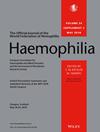Exploring the Impact of Laboratory Reagents on Pharmacokinetic Profiling
Abstract
Background
Laboratory reagents impact measured factor activity of extended half-life (EHL) concentrates. Variability in measurements may lead to under or over estimation of the pharmacokinetic (PK) parameters, and thus influence clinical dosing decisions. Since 2020, WAPPS-Hemo (www.wapps-hemo.org) has been collecting reagent information when haemophilia centres submit data for PK parameters estimation.
Objectives
To identify the pairs of concentrates (recombinant FVIII and FIX) and reagents leading to significant discrepancies between observed PK estimates compared to WAPPS-Hemo population.
Methods
PK data were extracted from the WAPPS-Hemo database. PK estimates were obtained using WAPPS-Hemo Bayesian engine and analysis was reported for terminal half-life and time to 3% following a 50 IU/kg infusion. Log-deviations between individual PK estimates and WAPPS-Hemo population PK models typical values were calculated to remove known sources of variability. Multivariate analysis of variance (MANOVA) regression was performed to assess the reagent effects.
Results
A total of 3853 and 1312 PK estimates were used to analyse reagent effects on the four FVIII and three FIX EHL concentrates, respectively. The reagent was not provided for 2391 PK estimates (46.3%). WFH unadvised reagents were provided for 78 PK estimates only (2.8% of known reagents). For each concentrate/reagent pair recommended by WFH, no significant difference was identified, except for rFIX-Fc whose PK parameters were significantly and clinically under-estimated by STA PTT-A.
Discussion/Conclusion
Real-world data provided by haemophilia centres showed high congruence with WFH guidelines, although its sizable number not declaring reagent. WFH-recommended reagents did not significantly impact PK estimation. For rFVIII-PEG, reagents also did not impact PK estimation. Although usually not enough data were available to assess reagents that were unadvised by WFH.

 求助内容:
求助内容: 应助结果提醒方式:
应助结果提醒方式:


